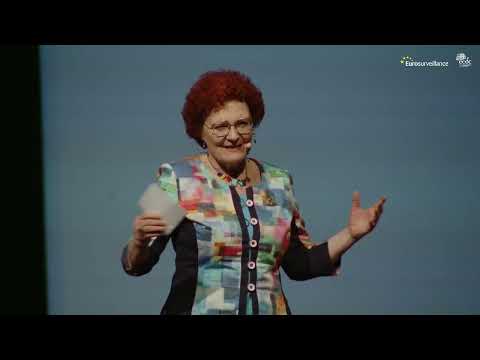Eurosurveillance seminar: Changing urban environments and impact on infectious diseases epidemiology, surveillance, prevention and control
Cities are constantly evolving; organisational and infrastructural changes are being considered or initiated to reach sustainable development goals (SDGs) by 2030 and there are attempts to improve resilience to expected or unexpected hazards. These endeavours, along with future steps to deal with environmental and socio-demographic issues, as well as remaining prepared for emergencies may entail profound transformations of urban environments. Tying in with the journal’s 2024 annual theme on changing urban environments and effects on infectious diseases and their surveillance, prevention and control, the 2023 Eurosurveillance seminar will discuss how urban environment changes toward SDGs and resilience are affecting or might affect infectious disease epidemiology, surveillance, prevention and control and how these activities may need to adapt or innovate to the urban changes to remain responsive or become more effective.
Date and time
Thursday, 23 November, 13.45 - 15.15 CET
Preliminary Agenda
| 13:45 - 13:55 | Opening of seminar ‘’Changing urban environments and impact on infectious diseases epidemiology, surveillance, prevention and control’’. Moderator, Henriette de Valk, Santé Publique, France |
| 13:55 - 14:00 | Welcome note by European Centre for Disease Prevention and Control Director Andrea Ammon, Solna, Sweden |
| 14:00 – 14:25 | “Green cities and vector borne diseases: emerging concerns and opportunities” Florence Fournet, Institute of Research for Development - Infectious Diseases and Vectors: Ecology, Genetics, Evolution and Control, Marseille, France |
| 14:25 – 14:45 | “Exploring changing urban environments in different future scenarios through foresight” Gerjon Ikink, European Centre for Disease Prevention and Control, Solna, Sweden |
| 14:45 – 15:10 | Panel discussion including Q&A |
| 15:10 – 15:15 | Wrap-up and close Henriette de Valk |
Moderator
Henriette de Valk
Dr Henriette de Valk is a medical epidemiologist at the French National Public Health Agency (Santé Publique France). As the head of the Foodborne, Vectorborne and Zoonotic Infections Unit she is in charge of surveillance, outbreak investigations and applied research. Dr de Valk is actively involved in European networking activities for surveillance of infectious diseases, as a national representative in supranational surveillance networks, as a member of the coordination group of the Vectorborne and Emerging Diseases network of the European Centre for Disease Prevention and Control (ECDC) and as supervisor in the European Programme for Intervention Epidemiology Training. She recently worked on guidelines for surveillance of emerging arboviruses, on the disease burden of foodborne intestinal infectious diseases and on whole genome sequencing for surveillance. She is serving on the national committee nominating the National Reference Centres (laboratories) for infectious agents in France and in Belgium.
Dr de Valk graduated from the University of Leyden in the Netherlands, the London school of Hygiene and Tropical Medicine in the United Kingdom and the Institut for Tropical Medicine in Antwerp, Belgium and is an alumnus of The European Programme for Intervention Epidemiology Training. Prior to coming to the Santé Publique France she worked for the NGO Médecins Sans Frontières (Doctors Without Borders) in emergency relief programmes in Sudan, Uganda and Mali, for the German Technical Cooperation (GTZ) in Cameroon and for the World Health Organization in Indonesia at the control programmes for diarrhoeal diseases and respiratory infections.
Speakers
Florence Fournet
Florence Fournet is a senior scientist and research director at the Infectious Diseases and Vectors Ecology Genetics Evolution and Control research unit (MIVEGEC) of the French National Research Institute for Sustainable Development (IRD) in Montpellier (France). Her research focuses on the relationships between environment and health in urban settings. She has been worked for a long time in West Africa on malaria and arboviral diseases. Since 2022, she has devoted her efforts to studying and mitigating the impacts of urban greening initiatives on vector-borne disease risks, with a special focus on Montpellier and Toulouse in the Occitanie region. She is committed to addressing the challenges posed by environmental change through interdisciplinary and intersectoral approaches.
Gerjon Ikink
Dr. Gerjon Ikink is Principal Expert Public Health Foresight and Determinants at the European Centre for Disease Prevention and Control (ECDC). Here, he oversees the establishment of the ECDC Foresight Programme: a cross-cutting strategic programme to help the ECDC and its partners to become more anticipatory, proactive and resilient to future threats.
He has a wide experience working on the interface between science, policy and society – focusing on systems-level, forward-looking and interdisciplinary issues. He previously worked as scientific advisor in the government of the Netherlands, and with the EU’s Group of Chief Scientific Advisors. Later, he worked as scientific policy officer at the European Commission’s Directorate-General for Health and Food Safety (SANTE) and the Health Emergency Preparedness and Response Authority (HERA). He started his career as a biomedical research scientist at the Netherlands Cancer Institute (NKI) and Antoni van Leeuwenhoek hospital, has a PhD in Molecular Genetics and Personalised Medicine, and has been an active science communicator since his studies.

